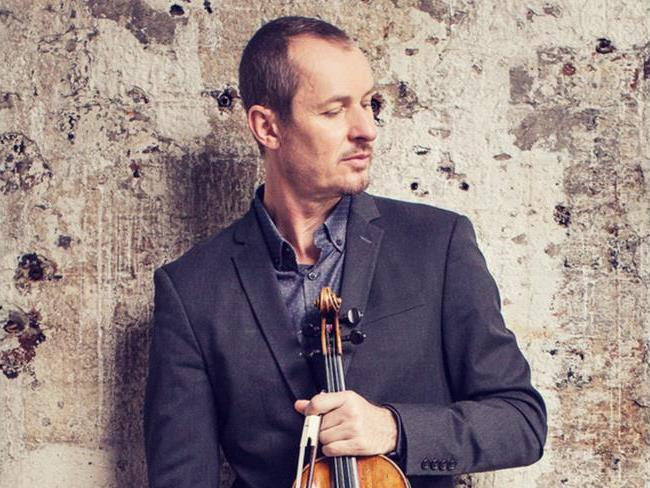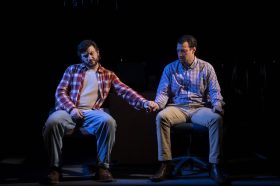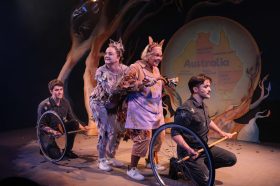Richard Tognetti, violin. Photograph via Melbourne Symphony Orchestra.
Britten’s Four Sea Interludes come from his first opera, a landmark work based on the troubled life and fate of outsider Peter Grimes, fisherman and loner living in Aldeburgh. They set the scene and provide telling psychological portraits of the opera’s main characters. Andrew Davis steered the work with surety, giving plenty of drive and well-judged resonance when needed. The first interlude Dawn, a seascape of innocent wide-open skies, is contrasted with ominously surging chordal writing inferring both the threat of storm and the unfortunate predicament of the main character. Sunday Morning is all clanging church bells and sunshine, accompanied by the chirps of birdcall followed by Ellen Orford’s theme: ‘Glitter of waves, glitter of sunlight’, symbolising Orford and Grimes’s giddy hopes for the future that are hopelessly improbable. Moonlight starts as the calm before the storm with tiny sprays of lightning developing into a powerful outpouring of sadness at the inevitability of the tragedy that is about to unfold. All hell breaks loose in the final Storm interlude, with crashing surf and driving rain symbolising the full horror of Grimes’s now piteous situation. Via mocking woodwind, almost a laughing deity aloft, we finally reach Grimes’s ultimate reflections on life: ‘What harbor shelters peace, away from tidal waves, away from storms? What harbor can embrace terrors and tragedies?’ The orchestra’s thoroughly understood performance under Davis was of the highest order.
It was good to hear Modernist Polish composer Witold Lutoslawski’s Partita for violin and orchestra with piano obliggato, originally conceived for violin and piano and orchestrated by the composer in 1988 for Anne-Sophie Mutter. The work is scored for a reduced orchestra with piano, an ensemble that requires intimate rapport with the soloist. Indeed, they react together as a large chamber music ensemble. Tognetti’s reading was well prepared and engaging, fully sympathetic to the work’s raft of gestures and emotions, ranging from tight, chromatic angst to loosely dreamy and wandering introspection. The burnished gold of his superb Giuseppe Guarneri de Gesù ‘Carrodus’ violin was glorious. The composition is in five sections with the second and fourth acting as recitatives, the soloist’s free material accompanied and imitated by piano. It demonstrated many of this composer’s hallmarks: clearly articulated form, brilliant colouristic effects and fine craftsmanship within a sound world of tonally supported chromaticism. I only wished that the orchestra, playing the Partita for the first time, had taken more of a prominent role in guiding the work’s rhetoric and drive.
If the Lutoslawski was not enjoyed by everyone in the audience, all was forgotten and differences of opinion settled with the ascending, smooth and sweet-sounding opening chords of Ralph Vaughan Williams’s touching pastoral romance for orchestra, The Lark Ascending (composed for violin and piano in 1914 and orchestrated in 1920). The work is a meditation on George Meredith’s ode to a skylark, but like the Britten there is evidence of deeper meanings, particularly of innocence lost, given that the work was written at the outbreak of World War I. Its free (bar-less) cadential writing speaks of joyful flight over an imagined idyllic English countryside, yet its gentle departure hints at the impending onset of one of the world’s most tragic conflicts. Tognetti’s generally fine performance was marred by sporadic impatience, and yet sustained high and extended notes far longer than proved convincing, the last two in particular suffered from insecure voicing and intonation. The performance was warmly received.
Rachmaninov’s ebullient orchestral suite, Symphonic Dances, Op 45 was his last composition and a summation of his orchestral output. Composed in Centreport, New York the work contains many hidden musical memories of the composer’s Russian homeland both sacred and secular. Davis and the MSO delivered a ripe performance encapsulating the broad Romantic grandeur of Russian ballet along with the thump of more visceral material. The second movement’s grotesquery via a heady waltz was excellent, prefiguring brilliant manifestations of the Dies Irae (Day of Wrath) chant from the Requiem Mass at the last.
Rating: 3.5 stars out of 5
Tognetti and The Lark Ascending
Melbourne Symphony Orchestra
Andrew Davis, conductor
Richard Tognetti, violin
Hamer Hall, Melbourne Arts Centre
20 August 2016





